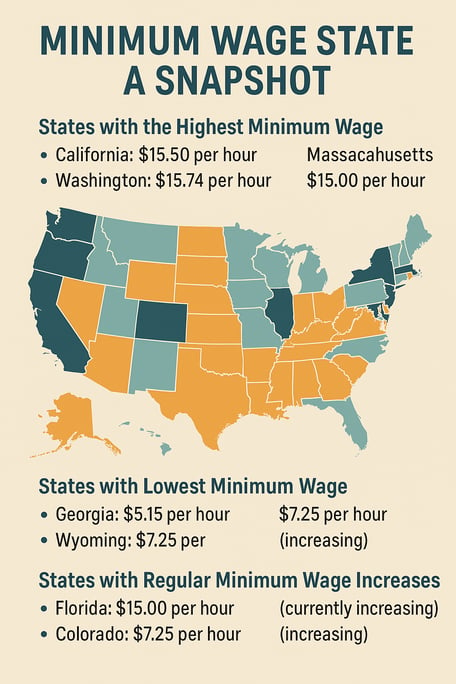What is Minimum Wage by State?

April 1, 2025

Minimum Wage Across America
In today's crazy job market, minimum wage laws aren't just some boring government rules—they're a crucial lifeline for workers trying to avoid getting screwed over. These laws make sure that no matter what job you do, you'll at least get paid enough to keep your head above water.
For all those freelancers, contractors, and temp workers bouncing from gig to gig—the folks who keep America's businesses running when they need extra hands—knowing these minimum wage rules isn't some optional homework. It's absolutely essential for making sure you don't get taken advantage of.
When you're working without the safety net of a steady paycheck or company benefits, understanding what you legally deserve in your wallet becomes your first line of defense. It's not about being greedy—it's about making sure you can pay rent next month while these companies benefit from your flexibility.
The system isn't perfect, and plenty of businesses still try to find loopholes or misclassify workers to dodge paying what they should. But knowing the rules of the game gives these contingent workers at least some leverage in a relationship where the deck is often stacked against them from the start.
The United States minimum wage system is a dynamic interplay between federal and state regulations, creating a multilayered approach to worker compensation. While the federal government establishes a nationwide minimum wage of $7.25 per hour, individual states and localities have the power to set higher rates that better reflect their unique economic landscapes. This variability means that a worker's earnings can significantly differ depending on their geographic location and specific employment classification.
From the bustling cities of California to the rural communities of the Midwest, minimum wage rates tell a story of economic diversity and regional economic challenges. For contingent workers navigating this complex terrain, knowledge is not just power—it's protection.
Key Objectives:
- What is Minimum Wage?
- The Role of Minimum Wage in Protecting Workers
- The Impact of Minimum Wage by State on Contingent Workers
- Understanding Overtime Pay and How It Affects Contingent Workers
- What Happens If You Are Paid Below the Minimum Wage?
- How Minimum Wage Rates Are Set in the United States
- Legal Protections for Contingent Workers Regarding Minimum Wage
- Frequently Asked Questions (FAQs)
What is Minimum Wage?
The minimum wage is the lowest amount an employer is legally required to pay employees for their work. In the United States, the federal minimum wage is set at $7.25 per hour as per the Fair Labor Standards Act (FLSA). However, this is just a baseline; individual states and localities are permitted to set their own minimum wages, often with the goal of better reflecting the local cost of living.
For example, states with a high cost of living, such as California or New York, tend to have higher minimum wage rates, whereas states with a lower cost of living may have lower rates.
The Role of Minimum Wage in Protecting Workers
The minimum wage serves several vital purposes in the workforce:
- Protecting workers from exploitation by ensuring that employees receive fair compensation for their labor.
- Addressing poverty by providing a baseline income for workers, ensuring that full-time employees can meet basic needs.
- Promoting economic equity by reducing wage disparities among workers in different industries.
For contingent workers, the minimum wage by state plays a crucial role in defining the baseline rate they can expect to earn, regardless of the work arrangement. It ensures that even workers in temporary or contract positions are protected by legal compensation standards.

The Impact of Minimum Wage by State on Contingent Workers
For contingent workers, understanding minimum wage by state is crucial, especially when working across multiple states or regions. It determines how much you can legally expect to be paid for the work you perform. Here are some key considerations for contingent workers:
- Contract Terms: If you're working as a freelancer or independent contractor, ensure your contract specifies minimum wage rates in accordance with local or state laws. Some states may require you to earn more than the federal minimum wage.
- Overtime Pay: In many cases, contingent workers are entitled to overtime pay for hours worked beyond the standard 40-hour work week. However, overtime pay rules differ by state, and not all contingent workers are eligible.
- Multiple State Employment: If you're working in multiple states or have clients in different regions, it's essential to be aware of the varying minimum wage rates in each jurisdiction to ensure you're being fairly compensated.
Understanding Overtime Pay and How It Affects Contingent Workers
Overtime pay is defined by the Fair Labor Standards Act (FLSA), which mandates that non-exempt employees earn at least time-and-a-half for hours worked over 40 hours in a given work week. This applies to both full-time and contingent workers in many cases, but there are specific rules that contingent workers need to understand:
- Non-exempt employees: Employees working on an hourly basis who are not specifically exempted under the law (such as certain professionals) are entitled to overtime.
- Contingent workers’ overtime rights: If you’re a contingent worker and work over 40 hours in a work week, you may be entitled to overtime, even if your contract stipulates a flat hourly rate. Overtime is typically calculated at 1.5 times your regular wage.
To protect yourself as a contingent worker, it’s essential to keep track of the hours worked and make sure your employer is following the overtime pay requirements according to both state and federal laws.
What Happens If You Are Paid Below the Minimum Wage?
If you are paid below the minimum wage, there are several options available to you as a worker:
- Report the violation: You can file a complaint with the Department of Labor (DOL) if your employer violates state minimum wage laws or pays below the federal minimum wage.
- Civil lawsuits: In some cases, you may be able to pursue a civil lawsuit against your employer if they fail to comply with wage laws. Workers may recover back pay and potentially additional damages.
How Minimum Wage Rates Are Set in the United States
Minimum wage rates are set through a combination of federal, state, and local regulations. The Department of Labor (DOL) establishes the federal minimum wage rate, but individual states and localities are empowered to pass laws setting their own minimum wage rates, which can be higher or lower than the federal rate. Regular increases and adjustments are often made to keep up with inflation and the cost of living.
Legal Protections for Contingent Workers Regarding Minimum Wage
Contingent workers are entitled to the same legal protections as full-time employees under federal laws like the Fair Labor Standards Act (FLSA). These protections include:
- Minimum Wage Compliance: Employers must adhere to both federal and state minimum wage rates, regardless of the employee’s employment status.
- Overtime Pay: Contingent workers may be entitled to overtime pay for hours worked beyond the typical 40-hour work week, depending on their classification.
If you're unsure of your rights, it's a good idea to consult with a legal advisor to better understand your situation and ensure you're receiving the pay you're entitled to.
Frequently Asked Questions (FAQs)
Can My Employer Pay Me Less Than the Minimum Wage?
No, employers cannot legally pay you less than the minimum wage, even if you're a contingent worker. If your state’s minimum wage is higher than the federal rate, your employer must comply with the state’s laws.
How Do State Minimum Wage Laws Affect Contingent Workers?
State minimum wage laws apply to contingent workers just like full-time employees. If the state has a higher minimum wage than the federal rate, employers must ensure they’re paying contingent workers at least the state minimum wage.
What If I Work Overtime as a Contingent Worker?
If you work more than 40 hours in a given work week, you may be entitled to overtime pay (time-and-a-half) unless your job is exempt from this provision. Check your contract and consult overtime laws in your state for more information.
Are There Any States Where the Minimum Wage Is Lower Than the Federal Minimum Wage?
Yes, Georgia and Wyoming have minimum wage rates lower than the federal rate, but only for certain types of employees. The federal wage will apply if the employer has over six employees or if state laws don’t cover the worker.
The Minimum Wage Maze: A Survival Guide for Contingent Workers
Navigating minimum wage regulations is more than a legal obligation—it's a critical strategy for financial empowerment, especially for contingent workers operating in today's dynamic employment market. The stark disparities in state minimum wage laws reveal a complex economic landscape where workers' earnings can vary dramatically based on geographic location and local economic conditions.
Knowledge is Your Primary Protection Understand that minimum wage is not a one-size-fits-all concept. States like California ($15.50) and Washington ($15.74) demonstrate significantly higher minimum wages compared to Georgia ($5.15) and Wyoming ($7.25), highlighting the critical importance of location-specific research.
Beyond the Base Wage Don't just focus on the hourly rate. Consider:
- Overtime regulations
- Additional local labor protections
- Specific provisions for contingent and contract workers
- Potential differences in wage calculations for different worker classifications
Proactive Financial Advocacy As a contingent worker, you must:
- Regularly verify current minimum wage rates in your state
- Understand your classification and corresponding wage rights
- Document all work hours and compensation
- Be prepared to assert your legal wage protections
Protecting Your Earnings
The most powerful tool in your arsenal is information. By staying informed about federal regulations, state laws, and industry-specific wage standards, you transform from a passive recipient of wages to an active guardian of your financial interests.
Remember: Your labor has value. Understanding and enforcing minimum wage laws isn't just about compliance—it's about recognizing and defending your worth in the professional marketplace.
Need Help?
Need help managing your contingent workforce? Contact TCWGlobal today to learn more.
Whether you need expertise in Employer of Record (EOR) services, Managed Service Provider (MSP) solutions, or Vendor Management Systems (VMS), our team is equipped to support your business needs. We specialize in addressing worker misclassification, offering comprehensive payroll solutions, and managing global payroll intricacies.
From remote workforce management to workforce compliance, and from international hiring to employee benefits administration, TCWGlobal has the experience and resources to streamline your HR functions. Our services also include HR outsourcing, talent acquisition, freelancer management, and contractor compliance, ensuring seamless cross-border employment and adherence to labor laws.
We help you navigate employment contracts, tax compliance, workforce flexibility, and risk mitigation, all tailored to your unique business requirements. Contact us today at tcwglobal.com or email us at hello@tcwglobal.com to discover how we can help your organization thrive in today's dynamic work environment. Let TCWGlobal assist with all your payrolling needs!

